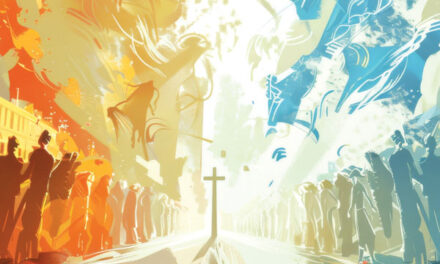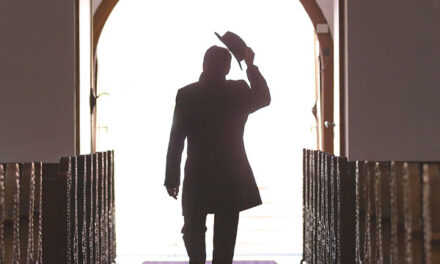I occasionally get emails from readers who reminisce about the good old days. They hope I’ll commiserate with them about how horrible the world has become.
One reader blamed the fall of America on the entertainment industry. “Back in my day, ‘The Andy Griffith Show’ led the way in promoting wholesome values,” he wrote. “Today’s shows promote violence and sexual promiscuity.”

While I don’t have a time portal to check the writer’s premise, I do subscribe to video streaming. I scrolled through an old favorite, “Frasier,” which ran 1993–2004.
During our parenting years, Becky and I often rushed the little ones to bed, turned the TV volume down low and bust a gut watching “Frasier.” It was good, clean entertainment, or so we thought.
In the show, Kelsey Grammer portrays a Seattle radio advice psychiatrist, Frasier Crane. The show’s 37 Primetime Emmy Awards suggest its writing, acting and direction were pretty good.
The good doctor is a fussy, uptight, cultured but arrogant broadcaster. Nevertheless, his sympathy toward working-class listeners, coupled with a strong sense of ethics, makes him likable.
Good, clean show, right?
Well, I wouldn’t be too quick on that conclusion.
Frasier satirizes sexism and uses humor to almost normalize sexual harassment.
In the supporting cast, Peri Gilpin plays Roz Doyle, Frasier’s radio producer whose open approach to dating is constantly ridiculed by the other characters.
Worse yet, she endures unwelcome advances from the host of the “Gonzo Sports Show.” Bob “Bulldog” Briscoe, played by Dan Butler, is constantly touching, kissing and butt-slapping Roz.
Ouch. Where was human resources when it was desperately needed in those good old days?
Worse, I’m appalled at how the main cast is entirely White. The U.S. population is about 13 percent Black, yet like many shows portraying America’s good old days, Frasier reflects racism by relegating African American actors to unwelcome interrupters.
Perhaps I should rewind our time machine all the way back to Andy Griffith, a show that portrays Mayberry as the friendly, close-knit community we should strive to achieve.
The series still confronts us—shamefully so—with a time when various shades of color or sexual orientation were little more than cameos or the subject of jokes.
Why bring up old TV shows in a spiritual column?
Because even the best classic shows disprove the premise that everything was better back then.
I’m not trying to shame you for your entertainment choices. I’m only asking you to consider how morality can both improve while at the same time become derailed.
If you read the Bible, you’ll know the notion of the coexistence of good and evil.
In the parable of the wheat and thistles (Matthew 13:24-30), Jesus rebukes good-old-days proponents who advocate spending our time rooting out the evil.
In verse 30 he says, “If you weed the thistles, you’ll pull up the wheat, too. Let them grow together until harvest time. Then I’ll instruct the harvesters to pull up the thistles and tie them in bundles for the fire, then gather the wheat and put it in the barn.”
Yes, our world is getting worse, but this parable tells me it’s also getting better. The worst will always exist alongside the best. Evil is a parasite that feeds on good, not the opposite.
So instead of commiserating about the passing of the good old days, let me encourage the Zen Buddhist teaching that “life must exist in the present or nowhere at all.”
Just keep in mind the church-camp song from the good old days—“He’s Got the Whole World in His Hands.”
Norris Burkes can be reached at comment@thechaplain.net. Follow us on Facebook, Twitter and Instagram: @insidesacramento. Burkes is available for public speaking at civic organizations, places of worship, veterans groups and more. For details and fees, visit the chaplain.net.















